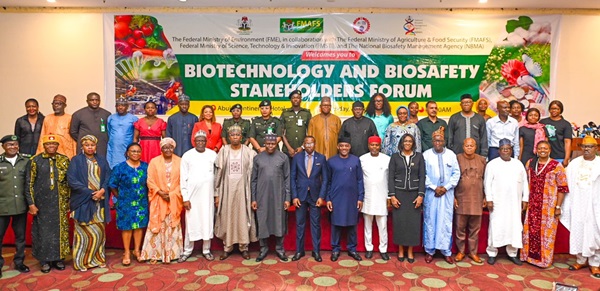
The Nigerian government has affirmed the safety of genetically modified organisms (GMOs), including the recently endorsed TELA corn, for both planting and consumption.
Emphasising the thoroughness of measures taken to safeguard human health against potential risks associated with GMOs, such as food safety, the government has underscored its commitment to regulating modern biotechnology. It aims to adhere to global standard practices that support agricultural modernisation while prioritising the health and well-being of citizens.
Minister of Science, Technology and Innovation, Chief Uche Nnaji conveyed this assurance during a gathering of biotechnology and biosafety stakeholders in Abuja. Nnaji addressed concerns among citizens, highlighting GMOs as a significant advancement in agricultural biotechnology. He emphasised their potential to boost crop yields, enhance nutritional content, and mitigate the adverse effects of climate change on food security.
Nnaji pointed out the positive impact already observed with the introduction of GM Cotton and GM Cowpea, which are proving transformative for farmers and offering hope for the revival of the textile industry and the reduction of the nation’s cowpea deficit.
Regarding the commercialisation of TELA maize, Nnaji expressed enthusiasm, citing its economic benefits, including increased yield, reduced pesticide use, drought tolerance, enhanced food security and improved livelihoods for smallholder farmers. He stressed the role of TELA maize in bolstering Nigeria’s competitiveness in regional and global maize markets while contributing to rural development and job creation.
Assuring the public of comprehensive risk assessment and rigorous biosafety measures, Nnaji referenced the successful adoption of GM maize in countries like South Africa and the United States, where no significant human health hazards have been reported.
In his remarks, director-general of the National Biotechnology Research and Development Agency (NBRDA), Prof. Abdullahi Mustapha underscored the importance of informed dialogue on GMOs, acknowledging prevalent misinformation and concerns surrounding their safety, regulation and socio-economic impacts. He advocated for evidence-based decision-making to bridge the knowledge gap and address controversies surrounding GMOs.
According to him, “The subject of GMOs has often been shrouded in misinformation, misunderstanding, fear, controversies, and concerns regarding their safety, regulation, ethical implications, and socio-economic impacts.
“However, as stewards of scientific progress, it is our duty to bridge this gap of knowledge and foster informed discussions that pave the way for evidence-based decision-making.
“Against this backdrop, our gathering today serves as a platform for informed dialogue, evidence-based discussion, and collaborative action to address the multifaceted dimensions of GMOs.”
Earlier in her welcome remarks, the director-general, National Biosafety Management Agency (NBMA), Dr. Agnes Asabgra, explained that the goal of the forum was to ensure the safe application of biotechnology and the protection of the country’s biodiversity.
Asagbra affirmed the biosafety agency’s commitment to providing a robust regulatory framework that safeguards human health and the environment from potential adverse effects of modern biotechnology as the agency stands at the forefront of regulating modern biotechnology in Nigeria.
In an interview with journalists, the director of the agricultural biotechnology department at NBRDA, Dr. Rose Gidado highlighted the urgency of addressing food security amidst the current crisis. She emphasised the promise of TELA maize in enhancing food security and noted its adoption by countries like the US, Canada, Brazil and Argentina, which have successfully tackled food insecurity through GMO adoption.
TELA maize, genetically engineered for improved insect resistance and drought tolerance, aims to boost farmers’ yield per hectare and address existing demand gaps in Nigeria.
Despite criticisms following Nigeria’s approval to release four varieties of GMO corn for commercial planting, the move positions Nigeria as the second African country to adopt and commercialise TELA maize varieties after South Africa. This step reflects Nigeria’s commitment to agricultural innovation and food security.

